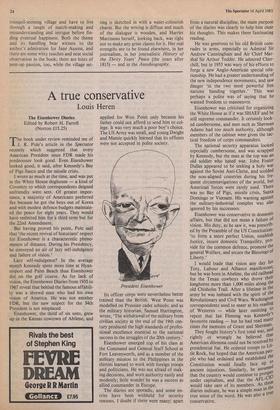A true conservative
Louis Heren
The Eisenhower Diaries Edited by Robert H. Farrell (Norton 15.25)
The book under review reminded me of J. R. Pole's article in the Spectator recently which suggested that every American President since FDR made his predecessor look good. Even Eisenhower looked good, it said, after Kennedy's Bay of Pigs fiasco and the missile crisis.
I wrote as much at the time, and was put in the White House doghouse — a kind of Coventry to which correspondents deigned unfriendly were sent. Of greater impor- tance, a majority of Americans preferred Ike because he got the boys out of Korea and with modest defence budgets maintain- ed the peace for eight years. They would have reelected him for a third term but for the 22nd Amendment.
But having proved his point, Pole said that 'the recent revival of historians' respect for Eisenhower is a characteristic pheno- menon of distance. During his Presidency, he conveyed an air of lazy self-indulgence and failure of vision.'
Lazy self-indulgence? In the average month Kennedy spent more time at Hyan- nisport and Palm Beach than Eisenhower did on the golf course. As for lack of vision, the Eisenhower Diaries from 1935 to 1967 reveal that behind the famous affabili- ty was a shrewd man who had his own vision of America. He was not another FDR, but the new respect for the 34th President is not misplaced.
Eisenhower, the third of six sons, grew up in the Kansas cowtown of Abilene, and applied for West Point only because his father could not afford to send him to col- lege. It was very much a poor boy's choice. The US Army was small, and young Dwight and Mamie quickly learned that its officers were not accepted in polite society.
President Eisenhower Its officer corps were nevertheless better trained than the British. West Point was modelled on Prussian cadet schools; and as the military historian, Samuel Hartington, wrote, 'The withdrawal of the military from civilian society at the end of the 19th cen- tury produced the high standards of profes- sional excellence essential to the national success in the struggles of the 20th century.'
Eisenhower emerged top of his class at the Command and General Staff School at Fort Leavenworth, and as a member of the military mission to the Philippines in the thirties learned to work with foreign troops and politicians. He was not afraid of mak- ing decisions, and wore authority easily and modestly; little wonder he was a success as allied commander in Europe.
The diaries are sporadic, and some en- tries have been withheld for security reasons. I doubt if there were many; apart from a natural discipline, the main purpose of the diaries was clearly to help him clear his thoughts. This makes them fascinating reading.
He was generous to his old British com- rades in arms, especially to Admiral Sir Andrew Cunningham and Air Chief Mar- shal Sir Arthur Tedder. He admired Chur- chill, but in 1953 was wary of his efforts to forge a new Anglo-American special rela- tionship. He had a greater understanding of the new independence movements, and saw danger 'in the two most powerful free nations banding together.' This was perhaps a polite was of saying that he wanted freedom to manoeuvre.
Eisenhower was criticised for organizing the White House as if it was SHAEF and he still supreme commander. It certainly look- ed cumbersome, and men such as Sherman Adams had too much authority, although members of the cabinet were given the tac- tical freedom of corps commanders.
The national security apparatus looked especially cumbersome, and was scrapped by Kennedy, but the man at the top was an old soldier who hated war. John Foster Dulles appeared to be seeking a holy war against the Soviet Anti-Christ, and scolded the non-aligned countries during his fre- quent circumnavigations of the world, but American forces were rarely used. There was no Bay of Pigs, missile crisis, Santa Domingo or Vietnam. His warning against the military-industrial complex was alas ignored by his successors.
Eisenhower was conservative in domestic affairs, but that did not mean a failure of vision. His duty, as he saw it, was prescrib- ed by the Preamble of the US Constitution: `to form a more perfect Union, establish Justice, insure domestic Tranquility, pro- vide for the common defence, promote the general Welfare, and secure the Blessings of Liberty.'
I would trade that vision any day for Tory, Labour and Alliance manifestoes; but he was born in Abeline, the old railhead for the Texan cowboys who drove then longhorns more than 1,000 miles along the old Chisholm Trail. After a lifetime in the army he was imbued with the spirit of the Revolutionary and Civil Wars. Washington correspondents used to sneer at his reading of Westerns — while later omitting t,0 report that Ian Fleming was Kennedy favourite reading — but he had read inanY times the memoirs of Grant and Sherman., They fought history's first total war, at'° rightly or wrongly he believed that, American dilemma could not be resolved by presidential fiat. He ordered troops to Lit- tle Rock, but hoped that the American peo- ple who had ordained and established the Constitution would finally face up t9 ancient injustices. Similarly, he assume° that the country would continue to ProsPe, under capitalism, and that the AFL-Clu would take care of its members. As .thesee diaries indicate, he was a simple man In 01 true sense of the word. He was also a true conservative.










































 Previous page
Previous page